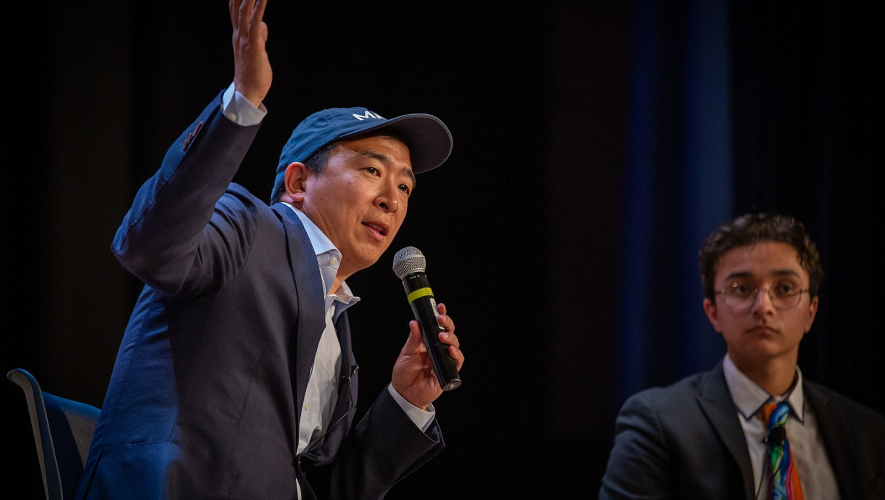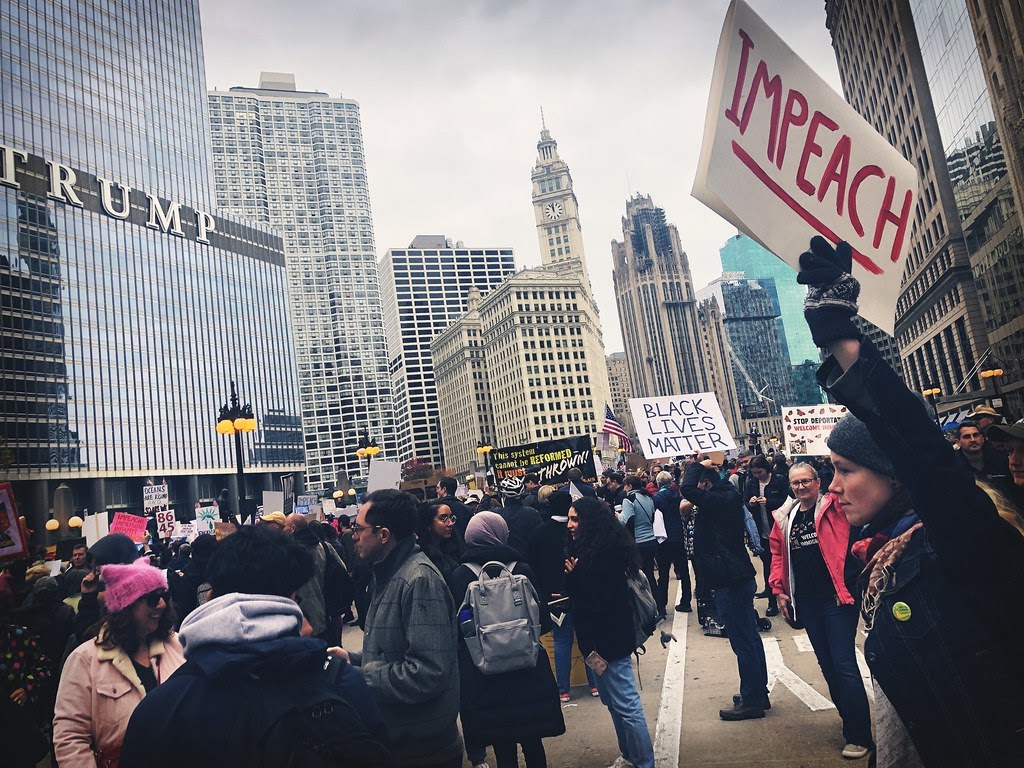In the US, Universal Basic Income (UBI) has become ever salient as the public grows more fearful of mass job displacement. The policy is a type of social security that guarantees a fixed amount of income to citizens. Andrew Yang drew attention to the idea during this year’s Democratic presidential primary through the “Freedom Dividend,” which would distribute an unconditional $1,000 a month to adult citizens; it is seen as a guaranteed income to tackle the forthcoming technological shift that will displace millions of American workers.
While UBI is certainly a good idea, there is reason to be skeptical. Besides logistical issues, national divisions would make any attempt to overhaul social welfare a back-breaking task. Furthermore, confusion over UBI’s specifics and implementation makes it a hard sell for policymakers. It is therefore important to untangle the strands of UBI proposed over the years.
UBI Isn’t New
UBI seemingly originated from Thomas Paine’s Agrarian Justice, in which he proposed a lump sum granted to citizens at adulthood. Activists, scholars, and politicians have suggested variants of Paine’s proposal, all of which aim to redistribute wealth through direct payments to people.
In the 1960s, Martin Luther King Jr. considered UBI as a way to redress discrimination against African Americans. But perhaps the most substantive recent idea was economist Milton Friedman’s Negative Income Tax (NIT), which would give people below a set income cutoff a percentage of their earnings as a supplement. If the cutoff was $40,000 and the NIT percentage was fifty, someone who made $20,000 would receive $10,000 from the government rather than paying an income tax. Friedman held that the NIT would resolve adverse market impacts and reduce the need for an intrusive state bureaucracy to decide who was eligible for welfare.
Though versions of UBI have been tried locally over the years, none had sufficient support to be implemented nationwide. As different iterations were introduced, the concept became so muddled that it’s unclear what exactly UBI entails. Given the increased interest in the idea, it’s critical to clarify how it would work.
Evaluating the Idea
There is an intense debate among economists over job automation’s impact on the labor market. Many believe that automation has happened before and that new technologies created opportunities for displaced workers. Others contend that automation will create fewer jobs than it replaces. These new jobs will require highly skilled laborers, and not all displaced workers are qualified to fill them.
If automation creates a net job loss, then job scarcity will increase, exacerbating inequality. This is exactly what has happened since 1987; until 2016, the rate of job displacement was six percent higher than the rate of reinstatement.
In the face of these uncertainties, an increasing number of people believe that UBI would be effective. Others believe that direct and unconditional cash transfers to those who most need it may be dangerous because their socioeconomic status reflects their moral failings; hence, the government cannot trust poor people to use this money appropriately. Policymakers also believe that UBI will discourage work and allow recipients to spend money on tobacco, alcohol, or other “temptation goods.” However, evidence points to the contrary.
Across most case studies, recipients’ well-being improved, and they spent their money on food, education, and health care. Ontario’s pilot program revealed that grantees did not spend money on unnecessary goods; cancelling the initiative led to the same problems before program implementation, proving to some degree that UBI improves lives.
Another common argument is that universal programs harm middle- and high-income earners. A study from Norway found that universal child care subsidies hurt higher-income families. Another study from the US determined that such expansion created nonexistent or negative impacts on higher-income children.
People often use UBI’s cost to discourage its implementation. A 2019 study found that UBI would cost more than half of America’s federal budget. A German analysis concluded that Germany would have to double its tax revenue to fund the program. India’s Ministry of Finance found that true universality would be difficult, ultimately advising its government to exclude the top 25 percent of income holders. Others argue that the policy’s potential funding models—such as taxing large corporations and wealthy people, quantitative easing to UBI (not banks), and nationalizing banks—are absurd, especially given the adverse effects higher taxes would have on the economy.
Andrew Yang disagrees, stating that Alaska funded the program for thirty-seven years. Economist Gregory Mankiw concurs, asserting that a value-added tax (like Yang’s proposal) has successfully raised revenue in Europe. The Roosevelt Institute goes further and claims that increasing the national debt could pay for UBI, and that it would expand the economy by 12 percent over eight years.
On employment, opponents claim that welfare disincentivizes work and shrinks labor supply. In fact, some argue that the Clinton-era welfare cuts incentivized employment. A 2016 MIT study revealed that conditional cash transfers could discourage people from work if they have sufficient income from a job, mostly due to a fear of being disqualified from cash transfers.
Proponents believe unconditional cash transfers increase labor participation. The aforementioned MIT study found no systematic evidence that cash transfers reduced recipients’ propensity to work. People who received unconditional cash transfers were more likely to shift to self-employment within the household. Their working hours did not change much.
The study focused on Mexico, Morocco, Honduras, Indonesia, the Philippines, and Nicaragua. The results show that cash transfer programs may be a legitimate strategy to tackle poverty and job insecurity in developing economies. A case from South Africa shows that when the government distributed social pensions to households with elderly members, adult employment increased, mostly through migration.
Other larger-scale studies yielded mixed results. Research in Finland and Alaska found that UBI had no meaningful impact on employment. Conversely, past studies on NIT during the 1970s show small but adverse effects on labor supply; a 2017 Swedish study on lottery prize money found that larger cash transfers reduced labor supply far more than smaller transfers.
Clearly, UBI needs more study to better understand its efficacy. While recent pilot studies in Germany and Austria could shed further light into its successes, there is an additional concern.
Political Resistance
At first glance, UBI is an alluring proposal that would address societal inequities and grow the economy by providing people a base income. But there are glaring issues that warrant skepticism.
UBI would be difficult to sell politically given the conflicting academic consensus. The idea has not matured enough to be implemented anytime soon, as experts cannot agree on a single version of UBI, debating whether it should be universal or conditional on a person’s income.
Ideology shapes how people view UBI, with liberals more likely to support the idea than conservatives. An August 2020 Pew poll showed that 66 percent of Democratic and Democratic-leaning respondents favor UBI, compared to only 22 percent of Republicans and Republican leaners.
Older conservatives may disapprove of UBI because it came from Andrew Yang, a Democratic candidate with young, enthusiastic, left-leaning followers. Yang’s base could have made it easier for conservatives to associate the idea with democratic socialism, something Republicans detest. Research also suggests that ideology and public discourse are powerful drivers that form opinions, meaning partisanship—and where people find information—determines whether they support UBI. In the US, deep partisan divisions will determine which side of the argument people see more.
Yet, there are sharp divisions within the political Left and Right as well. Most famously, President Richard Nixon proposed a form of UBI as part of the War on Poverty, but it was struck down by a bipartisan majority in Congress. Democrats rejected the bill because it did not do enough to help those in need, while Republicans found the concept contradicted their small-government ideals. More recently, the Communist Party USA argued that the “longer-term outcome of UBI would likely be an increase in prices,” rejecting the idea. Politics is as much of an obstacle as the substance of the issue.
That is not to say that there is no bipartisan agreement. Both sides believe that the current welfare system fails to help people escape poverty and become self-sufficient. Nobody disagrees that there are people in need of help. There is just no single idea bridging the divide.
The most important question is not whether experts can agree on an idea—it is whether an upheaval of the welfare system is beneficial in the long run. While UBI is one of many solutions on the table, there is scant evidence that it is worth the investment.
An inherently political question will be how policymakers sell the idea of sacrificing current welfare in exchange for cash handouts. Experts state that current pilots are nowhere close to explaining whether UBI would work since experiments did not test for long-term effects. They believe replacing existing welfare programs would be highly regressive unless the government allocates substantial funds to UBI. Others add that UBI would benefit those with relative wealth more than the poor because inflationary pressures impact the poor more.
Going Forward
UBI, as one scholar put it, has built momentum through the “joy of anticipation,” making it a politically motivated decision rather than an economic one. While experts and laymen may agree with the idea in principle, the body of literature provides conflicting and inconclusive results. There is still little evidence UBI will mitigate the effects of mass unemployment due to automation. Furthermore, studies find that citizens like to assume that the government can finance UBI without new taxes, which has been refuted time and time again. Ideals and reality do not align, and a half-baked plan would only push more people away from the idea.
Much more has to be proven before UBI becomes an actual policy that politicians can campaign on. For now, many experts seem to agree that targeted programs and welfare reform are more feasible.
This does not completely discredit UBI though.
Automation and job loss are real issues that countries will face soon (if not already), so policymakers should comprehensively examine UBI. Reconsidering the data—and monitoring the latest studies—will only deepen the conversation on whether UBI can help alleviate future job scarcity in the US.
Ultimately, policy discussions must remain just that—discussions—not emotional squabbles along ideological lines. Otherwise, even the most compelling proposals will seem “partisan” or “biased,” and that is counterproductive. It is up to future research to reverse the political tides toward sound analysis. It is under these circumstances that we will truly learn UBI’s efficacy.



